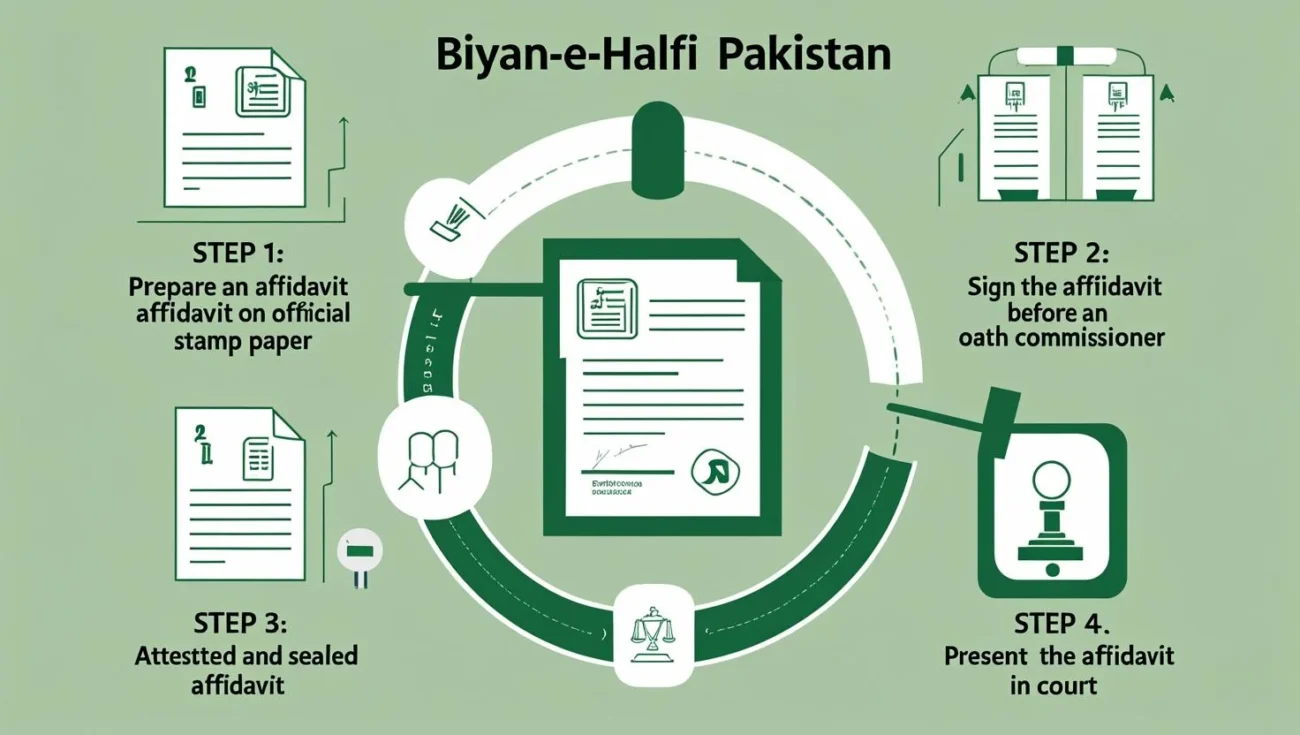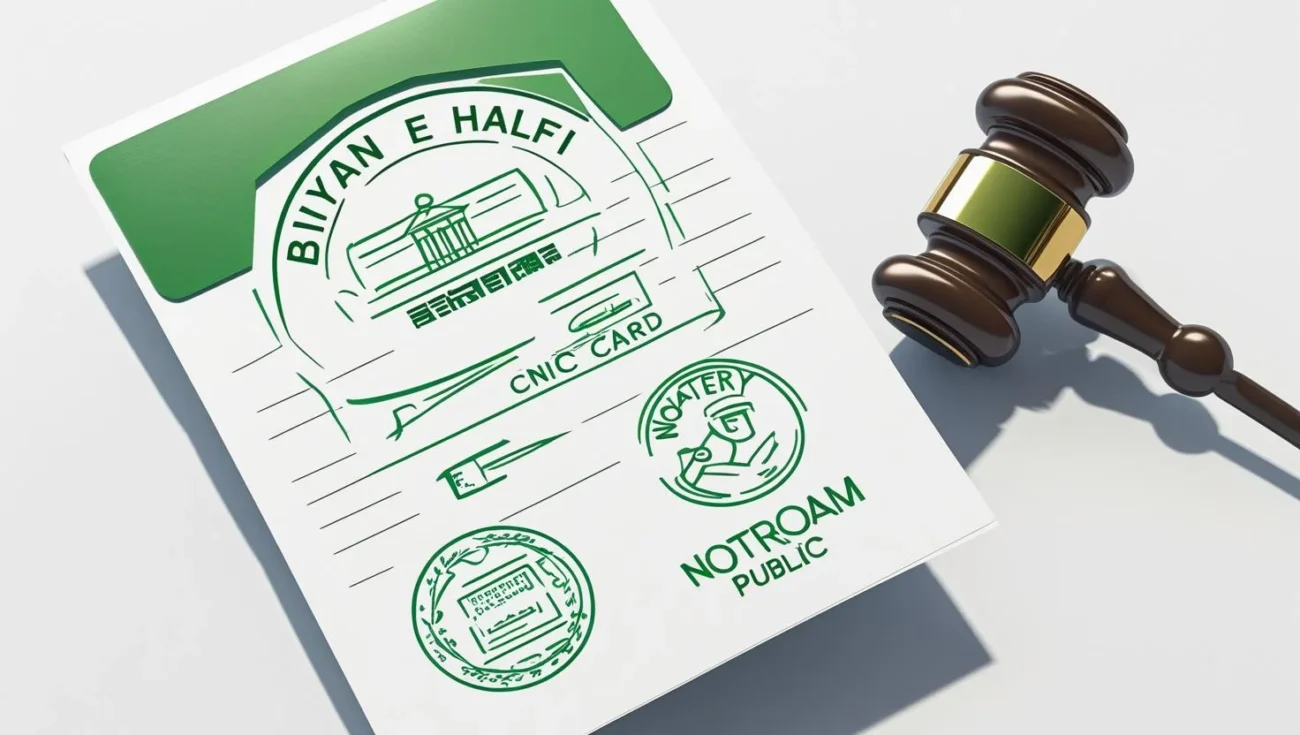In Pakistan, the legal system recognizes different documents for achieving fairness, order, and clarity in personal, administrative, and legal functions. Among them, biyan e halfi holds special significance. It is a bayan halfi is a obras legal document and a sworn declaration, and a biyan-e-halfi is used for official matters including court cases, as a seal of approval for one’s declaration. Be it for a claim for succession, financial dealings, or personal commitments, a biyan e halfi is crucial in Pakistan’s legal system.
What is Biyan e Halfi?
Biyan e halfi is known widely as an affidavit. It is a legal document in which an individual swears to the truth of a specific fact or phenomena, It is compiled into a signed document by the swearing individual before an Oath Commissioner or a Notary Public, making the Bayan-e-Halfi a relevant legal instrument in Pakistan. An Oath Commissioner or notary bears no liability for the content of the affidavit; the risks and responsibility lie solely with the signer. Any claiming false a bian e halfi can lead to fines, imprisonment, or other legal consequences in Pakistan.
Basically, a bayan e halfi serves as a form of documentation which is important for legal and administrative tasks. It is used when a certain situation requires verification or a formal confirmation of a claim without tangible proof.
Legal Importance of Biyan e Halfi in Pakistan
Like most countries, Pakistan has a defined legal judiciary system which operates on certain agreements like biyan e halfi. This method ensures that stated agreements are accepted and additional documents such as bayan halfi can greatly improve the validity of the claim. Many people in Pakistan also use bian e halfi documents in civil and inheritance disputes as well as in financial disputes and transactions.
Bayan halfi documents hold such a strong importance value because they can be used in government documents as well. Many aim to apply for educational or political importance and identities which also require legal verification, the biyan e halfi makes the verification process easier. This system has been put in place to minimize fraud and strengthen the reliability of document.
Preparation and Format of Biyan e Halfi
In Pakistan, the preparation of bayan e halfi documents follows a prescribed order. It starts with the declarant’s full name, father’s or mother’s name, CNIC number, and their address. The bian halfi form contains a clean logical sequence free of ambiguity. The last part contains the declarant’s statement affirming his or her declaration is correct to the best of his or her knowledge.
As with any legal document, bayan halfi has to be notarized. To ensure its legal enforceability, the Biyan-e-Halfi must be duly signed by an Oath Commissioner or a Notary Public. Stamping and attestation are critical to its acceptance in judicial and government offices. The document must be notarized in order to be legally accepted. The document must also contain notarized statements, or else it is presumed to carry no legal weight.

Types of Biyan e Halfi Commonly Used in Pakistan
In Pakistan, bian halfi are used in different ways based on the situation. The affidavit of ownership is one of the most common, where a person claims to own a property or an asset. Another common type is the affidavit of identity used for verifying one’s identity in different institutions and offices. There are also affidavits regarding inheritance, property and business transactions, admission in educational institutions, and even an application for a political office.
A good example is the application for a domicile certificate where a biyan e halfi for a domicile is needed declaring the person’s permanent residence in a certain district. Another example is the elections where candidates are required to submit nomination papers that are accompanied by affidavits of their assets and liabilities, and a criminal history, if any. These examples demonstrate the way Pakistan relies on the bayan halfi for their day to day administration and legal activities.
Attestation and Verification of Biyan e Halfi
Legal attestation is required for bian halfi. Usually an oath commissioner or notary public handles this. These persons are permitted by Pakistani legislation to take oaths and certify affidavits. There are some instances, for one, overseas Pakistanis, where a bayan halfi also needs to be attested by a Pakistani consulate or embassy for it to be accepted within the country.
Verification is another important part. In some sensitive cases, the courts or other bodies may check the biyan e halfi for claims verification. These claims, if proven untrue, can lead to legal punishments under the Pakistan Penal Code. Such stringent measures highlight the affidavit filing process.
Role of Biyan e Halfi in Civil and Family Matters
A Biyan-e-Halfi often forms the cornerstone of a party’s position in civil cases, particularly in matters concerning land and property. Parties present affidavits confirming ownership or possession of the land and the courts examine these affidavits together with other evidence to determine the most equitable decision.
In family matters, bayan halfi is just as important. During inheritance disputes, it is common for heirs to issue an affidavit stating their relationship to the deceased. In family disputes regarding children, marriage, or divorce, the involved parties may rely on biyan halfi to substantiate their contentions. By conveying information in a sworn format, these affidavits significantly facilitate the resolution of legal matters.
Use of Biyan-e-Halfi in Administrative Procedures
Not just in courts, but administrative bodies in Pakistan require bayan e halfi for numerous reasons as well. In higher education, certain colleges and universities may require their students to submit affidavits declaring to follow the policies of the institution. Such affidavits also apply to banks in relation to loans and guarantees or resolving disputes.
Election offices also rely on bayan halfi to substantiate information where candidates submit their nomination papers. This ensures that candidates do not conceal the facts of their biodata, assets, and liabilities. The Election Commission of Pakistan considers the submission of false affidavits as a declaration of an offence, leading to disqualification from contesting.

Issues Related to the Biyan e Halfi System
Pakistan’s bian e halfi system comes with a set of problems. One of the key problems is the misuse of affidavits. People submit incorrect affidavits with the intent of changing a decision that is based on legal procedures or administrative procedures. This act diminishes the system’s integrity. Although such actions can be legally dealt with, the application of such laws is often lazy.
The incorrect drafting of affidavits is not the only problem. There is also the issue of bayan halfi not being widely recognized, leading to difficulties in its proper preparation and sponsorship. This is mainly because people write affidavits on their own, which causes a number of problems. In the case of rural folk, even the oath commissioners are not accessible, which delays the process of submitting affidavits.
Government Initiatives for Changes
The government of Pakistan is working to create a system to improve the handling of biyan e halfi, which includes defining its rules concerning its preparation and attestation. Digitization of records and attestation is one of the key ways to improve efficiency. Urban areas are being targeted first with the gradual rollout of online notary and oath commissioner services. The public bayan e halfi system is being made accessible, effective and secure for all.
Conclusion
In Pakistan, bian e halfi is more than just a document or a piece of paper; it is a legal document that must be sworn to, acting like a document of legal significance that is essential in court cases, government dealings, and other administrative work. Bayan e halfi is a crucial document in almost all administrative processes, ranging from settling a dispute over property, claiming inheritance, college admissions, and even during elections. Bayan halfi is an essential document that ensures that the truth is verified and accountability is met.
Within Pakistan, there are gaps of awareness and misuse of the system, but there is still hope for the future, as reforms in digitization and attestation are making the system much more reliable. For the citizens of Pakistan, it is extremely important to know the steps that need to be taken to prepare the biyan e halfi, the legal implications, and the outcomes of the document. Understanding the implications of the document and fulfilling the legal requirements will enable the citizens to take control of their rights and work toward transparency in their legal affairs, personal dealings, and professional relationships.


